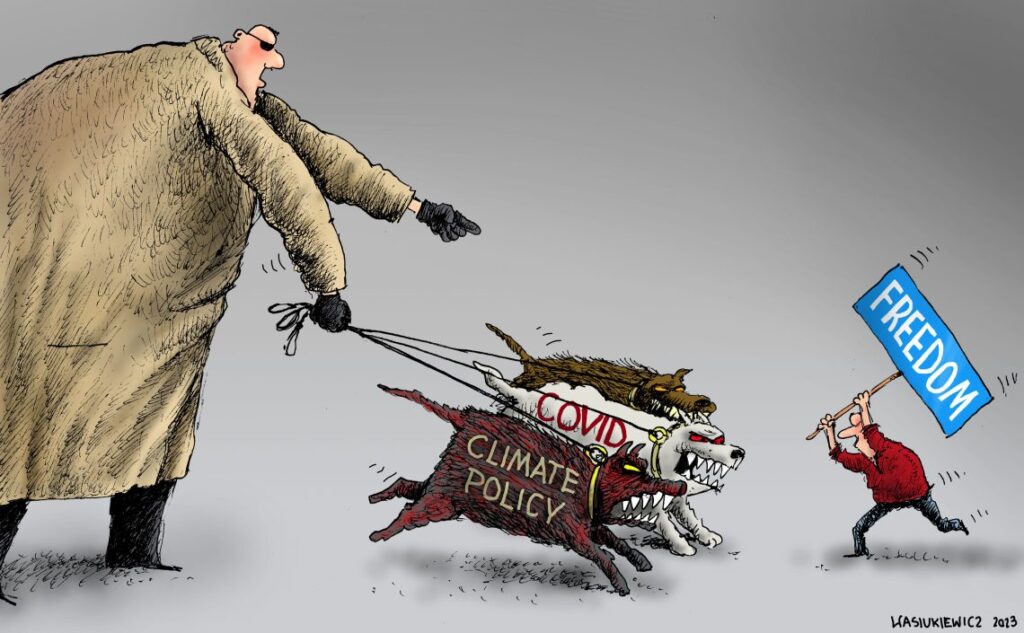Do not fear defending freedom

In crisis, democratic citizens must not exchange their freedom for safety falsely promised by power-hogging governments. Now is the time to rebel and decentralize the system.
Most of what we hear regarding the coming year is about risks. Risk and pessimism have been the focal points of public discussion. Many in Europe fear their children will not enjoy as good a life as they have had. At the same time, media, nongovernmental organizations (NGOs), politicians and technocrats preach the coming of the Four Horsemen of the Apocalypse.
A new Rider who joined war, famine, plague and death is climate change. There has been climate disruption, of course, and it is also true that we should do the maximum reasonably possible to reduce pollution and waste. But we must also think more positively about how to adapt to changes in the atmosphere and climate patterns.
The panic caused by the coronavirus is over, but now we are told that the plague rider of more disastrous “zoonotic spillover” pandemics is around the corner.
Unfortunately, war exists. That Horseman has accompanied humankind since its dawn millennia ago and will continue to be with us. There was no war close to Europe and the United States for a while, but brutal armed conflicts raged in other parts of the world. Now war has returned to Europe, and we see the dire consequences of ignoring this truth. Western countries became so afraid of “militarism” and blinded by naive notions of all-encompassing peaceful progress that they missed the writing on the wall.
Switzerland is the world champion of… “human freedom”
Chuck Adams: “We love Switzerland and its creed of freedom”
Anti-freedom fighters
While the media shows sparse concern for the causes of economic fragility and inflation, other perceived threats are intensely commented on, and fear is being spread. Unfortunately, the fearmongers use the situation to amass power and make people believe that the state has the answers. The price that citizens pay for this is steep: we are asked to exchange freedom and civil rights for an illusion of security.
A new class of public actors has emerged, called activists. An activist bathes in the problems while proposing no realistic solutions, often making them difficult. These figures usually have scant experience in any practical activity or profession but are highly visible at international conferences, shouting in public. They block roads, occupy official buildings and act aggressively, even hatefully, toward those tarred as enemies of change. Some activists purposely damage property – lately, by gluing themselves to priceless art objects in museums – and dare to claim that it is all for a good cause. However, arrogant speeches by celebrity activists such as Greta Thunberg are not geared toward finding solutions. Instead, they spread fear. And this is desired, as people who are afraid are easier to manipulate to surrender their freedom and rights.
A tsunami of laws and restricting regulations confront citizens and businesses, limiting freedom of choice and action.
Well-known Canadian author Naomi Klein makes no secret that radical fight for climate primarily serves to destroy the existing market economy systems. Ms. Klein’s solutions are Marxist.
Another example of this convoluted logic was the panic created by politicians, publicity-hungry scientists and the media around the Covid-19 pandemic. Indeed, the new virus’ risks, especially its early mutations, had to be taken seriously. However, states, supranational organizations and NGOs went out of their way to grab additional powers amid the created hysteria.
As is evident at any G20 meeting, new systems are being conceived to control citizens globally. Centralization schemes are multiplying on the national and supranational levels – all dressed as solutions to problems. In fact, they are little more than power grabs. A tsunami of laws and restricting regulations confront citizens and businesses, limiting freedom of choice and action.

Self-dealing elites
In centralized systems, leadership grows increasingly distant from the citizens – and accountability and transparency shrink, creating a more comfortable space for technocratic bureaucracy. Somehow the fourth power in democracies, the media, is not addressing this issue. They are happy to applaud an overpowering state and its false “solutions.”
Many media bigwigs prefer to go along, as they find the system comfortable. But citizens should not be afraid and stand for freedom. Civil society in Europe and the U.S. remains strong and will, one hopes, respond resolutely to the overreach by states and pressure groups.
Justified opposition is often besmirched as radical and irrational, which helps to marginalize it. However, we have already seen rising civil disobedience during the coronavirus pandemic. These protesters were not all deranged individuals; many were discerning citizens justifiably upset by the government’s poor argumentation. Governments imposed allegedly science-based, often draconian, measures but refused to assume responsibility for the consequences. And in the end, they came up short in providing convincing scientific justification.
Post-globalization: The West’s strategy options
Time to act
As a result, freedom is endangered and so is prosperity. Faint-heartedness and reducing ourselves to hapless protests and being depressed by climate, diseases, war and radicalism is not a solution. We need to be optimistic and courageous and address the problems head-on. We have excellent reasons to be confident because the private sector is finding practical solutions for clean energy and recycling, and our medical research is very successful. And please note the many indications that young people in Europe are gaining optimism.
The way to restore our market economy’s vigor, strengthen democracy and make our social systems more resilient is decentralization. It brings politics closer to the citizens. Experience shows that democracy works best in decentralized areas with high accountability. We must get out of our fear-ridden, overregulated comfort zone.
It is high time for us to use all constitutional and legal tools to contest unconstitutional, unrealistic, damaging and freedom-limiting laws and regulations. Being legally right but unsuccessful is not an option: there might be instances when civil disobedience will not only be justified but required.
Author: Prince Michael of Liechtenstein founder of GIS.
Source:





